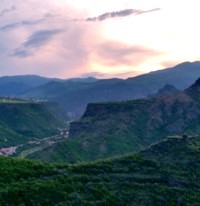Oil
Baku sits over one of the world's largest oil deposits. So, as in Los Angeles, water holes and wells were often naturally polluted by oil and tar. This occasionally resulted in explosions and fire and was a nuisance to one and all. Yet after some simple distillation the resulting kerosene proved to be an alternative to more expensive animal and plant oils for use in lamps.
Soon the by-products of improving distillation methods included lubricants and heavy tar or pitch, which had a number of uses, together with a range of chemicals of interest to early chemists, some used in patent medicines. Thus mineral oil was of increasing economic value and natural seepage was soon insufficient to meet the growing demand. As a result Baku boasts the world's first industrially drilled oilwell, bored in 1846. It's still here, adjacent to an active, producing, shaft.
The world's first industrially drilled oilwell, bored in 1846
Nearby is one of hundreds of still active shafts
In 1886, forty years after this well was drilled, Karl Benz patented a four-stroke petrol (benzin) engine to automate the world's first self-powered vehicle (automobile) to go into series production. Before this 'horseless-carriages' were playthings for the rich or backyard inventors, and in some towns had to be led by a servant, walking, with a red flag, to warn the public - and to avoid scaring the real horses.
Much of the fuel for these newfangled vehicles in Europe came from Baku.
Automobile development was rapid and with this came development of the fuel. The full impact of early 20th century science was brought to bear. In institutions and laboratories from Moscow to Paris; Manchester to Chicago: ethane, methane, propane and benzene were identified; knocking factors (octane ratings) were codified; empowering additives, like tetraethyl lead, were developed. In increasingly complex 'oil refineries' mineral oil was cracked and reformed to increase the yields of various grades of fuels and lubricants. Soon the wealthy drove in limousines on new smoother roads, surface sealed with bitumen. In the United States, Rockefeller, already dominating the lamp oil market with Standard Oil, would become the World's richest man.
Just fifteen years after Benz's invention the Wright Bothers powered their first 'Flyer' with a lightweight petrol engine of their own design, leading to another rush of innovation. Another seven years later, in 1908, Henry Ford would begin to mass-produce the first 'peoples' car' (automobile), the Model T. Meanwhile petroleum powered internal combustion engines would spin dynamos for industrial and domestic electric lights and the propellers of speed boats; launches; and fishing boats.
Then in 1914 came the Great War. Fighter aircraft, bombers, submarines and tanks had all become possible as the refining of mineral oil expanded in complexity; scope; and scale. After the Great War, in which oil enabled the greatest slaughter of human life the planet had yet seen, it became central to world power-politics and commercially became known as: 'black gold'.
So Baku, that produced about 15% of global oil production, was the new Eldorado, most of it controlled by British companies. Meanwhile, at the end of 1917, the Bolsheviks had lost control of the Grozny oilfields to the White Army (see below) and Baku became their sole source of oil. An alarmed Vladimir Lenin asserted in one of his speeches that: 'Soviet Russia can't survive without Baku oil'.
In 1939 a Second World War followed the First and Baku became the life blood of the Russian invasion of Poland, in collusion with Germany. Hitler's perfidy became clear to Stalin when in July 1942 Germany and its allies (the 3rd Romanian Army) quickly overran all the Caucuses oil fields, in Chechnya and Baku.
Ultimately Russia under Stalin, with US and British Imperial allies would be victorious over Germany. More of that later in Georgia (below), where we visited Stalin's birthplace.
Thus today, oil, that was at the beginning of the 20th century little more than a nuisance, is a driving force in global power politics.
When one stands on the shoreline in Baku, oil derricks dot the Caspian Sea as far as the eye can see and around the flats of the city donkey pumps see-saw, bringing up the 'black gold'. The Baku air has a distinctly oily aroma and a web of pipelines carry off the harvest to help sate Europe's endless thirst for oil and gas: to provide energy and in so doing to turn it into carbon dioxide.
In 2018 27.9 million barrels of oil were transported through the Azerbaijani part of the Baku-Supsa pipeline alone.

